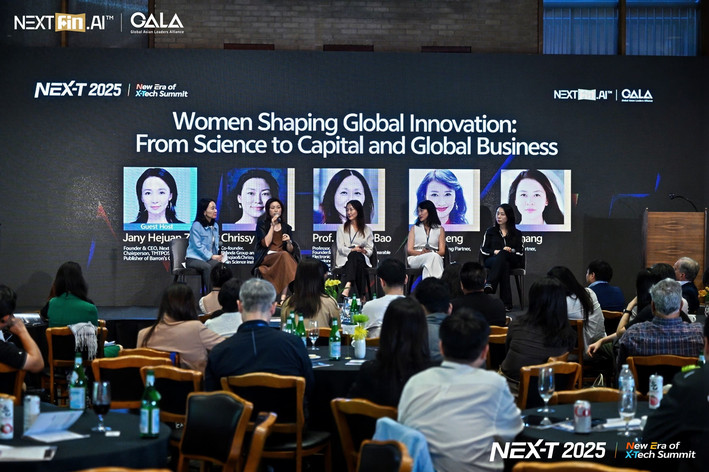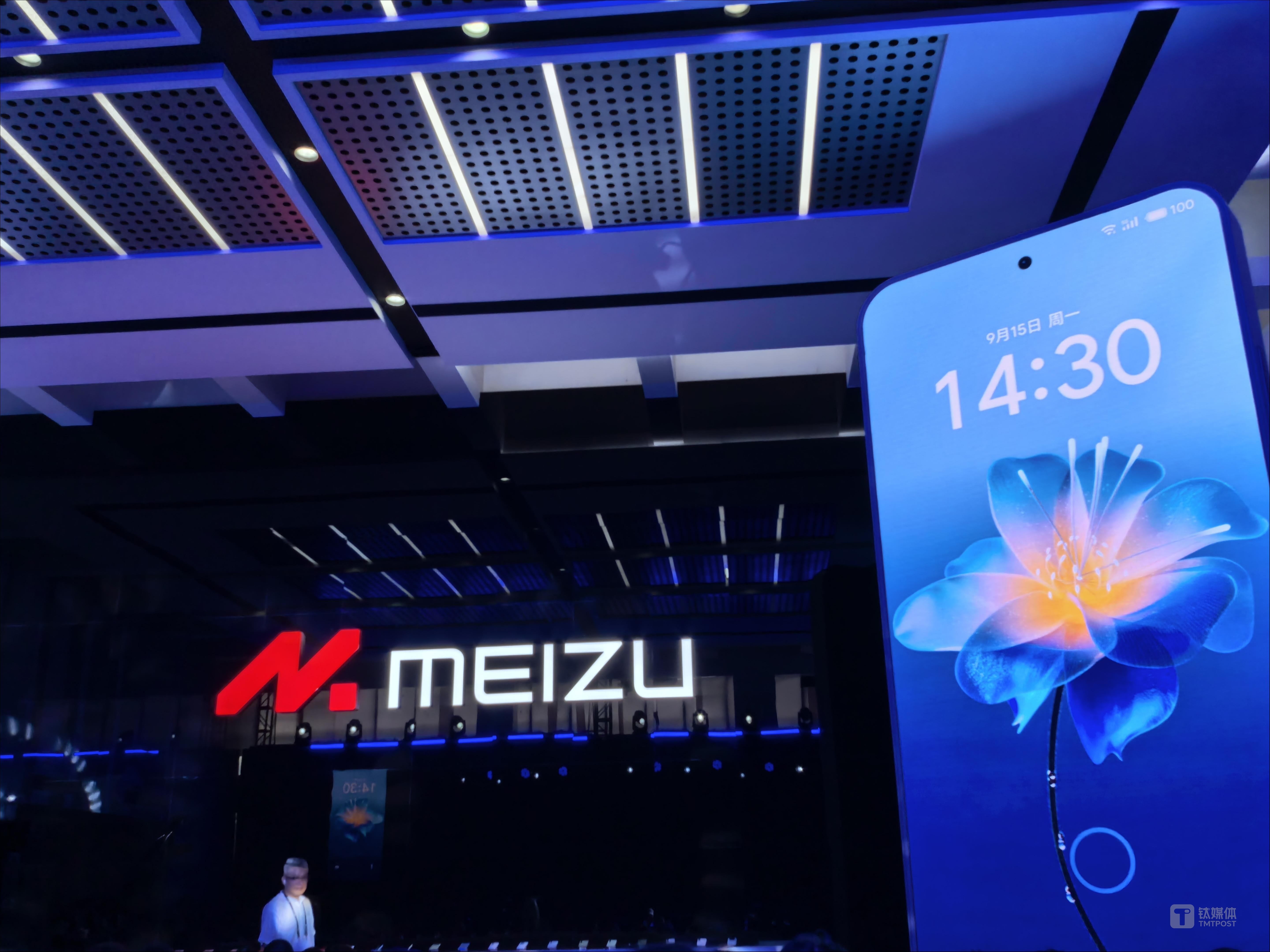
On-site photo
Self-leadership is the foundation for broader impact, said Chrissy Luo, the co-founder of Shanda Group and Tianqiao & Chrissy Chen Brain Science institute (TCCI), has said recently at the NEX-T Summit 2025 hosted by NextFin.AI and Global Asian Leadership Alliance (GALA) in Silicon Valley.
Leadership starts with taking ownership and executing with courage and wisdom. Even without formal authority, the leader’s initiative and commitment can inspire others and drive meaningful change, she said.
At the panel "Women Shaping Global Innovation: From Science to Capital and Global Business" on September 27, she joined discussions with Bao Zhenan, the founder & director of the Stanford Wearable Electronics initiative; Holly Zheng, the founding & managing partner of EnvisionX Capital andan adjunct professor at USC; and Lu Zhang, the founding partner of Fusion Fund.
"I feel that leadership is sometime not only that, how many people (you) lead, but more important (about) how you lead yourself, so make your job done. It"s actually already amazing that when we practice our philanthropic, you know journey starts from zero, right? So we have to learn and start to conquer some very basic questions or challenges," she explained.
Luo also shared how both personal curiosity and strategic foresight guided her philanthropic and entrepreneurial focus on brain science. "From a personal perspective, Tianqiao and I share a lot of curiosity to what happened when we make decisions, when we have emotional turbulence and also why and we are what we are, so the curiosity driven philanthropy, I think, is not always the most common in the field in our peer group, but I feel is probably can support you go to a long way because it"s very inertial, and this is from your bottom of your heart," she said.
This curiosity-driven passion has shaped TCCI"s mission and its research direction, allowing the institute to pursue innovative projects that address mental health challenges and neurodegenerative diseases while exploring ways to unlock human potential, she added.
Luo emphasized that strategic considerations also informed their focus. "As entrepreneurs, we believe brain research can not only help treat disease but also enhance creativity and learning. In the new era of AI, understanding the human brain becomes even more profound, especially as society grapples with questions about human relevance and purpose in a world where AI can replicate many human capabilities."
Reflecting on leadership, Luo noted the unique qualities women bring to innovation and entrepreneurship. "Women leaders often show more patience and collaboration. While we can learn from male counterparts about boldness and risk-taking, it"s critical to retain compassion, inclusiveness, and patience, which are essential for building strong communities and sustainable enterprises."
Bao, also a professor at Stanford University and the winner of the UNESCO Women in Science Award, shared her perspective on navigating scientific research and professional development as a woman. "It"s all about mindset," she said. "You can either let societal perceptions limit you or embrace your uniqueness and take confidence in what you do. Women are fewer in certain fields, but that can be a source of strength."
Bao, also a member of the U.S. National Academy of Engineering (NAE), pointed out that passion and genuine interest drive persistence. "If you work on things that excite you, it doesn"t feel tiring, and you always feel energized. That"s what keeps me going in research and life." She encouraged students to use their academic and professional journeys to discover what they are truly passionate about, noting that interests and goals evolve over time.
Zheng, also the chairwoman of BlueFocus International, shared her experience in building global businesses and leading across continents. "Globalization has always been central to my career," she said, recalling her early work at Cisco Systems and later at BlueFocus International, where she helped Chinese brands expand into global markets. Despite contemporary discussions of de-globalization, Zheng emphasized that the fundamental principles of globalization—scale, flexibility, and the integration of global and local insights—remain vital.
Zheng stressed the role of AI in enhancing human capability. "I am a strong believer that AI can make talent more fluent, enabling people to focus on creativity and leadership rather than repetitive tasks. Globalization and technological empowerment go hand in hand, creating opportunities for women and men alike."
Zhang recounted her journey from a material scientist to an entrepreneur and eventually a venture capitalist. Initially skeptical about venture capital (VC), she realized the power of VC to accelerate innovation. "VC is a catalyst. It allows you to connect technology, operational experience, and capital to support diverse innovators. My goal was never to be a traditional investor but to help transformative ideas reach their potential."
Zhang emphasized the importance of a global perspective, noting that Silicon Valley"s success stems from attracting top talent from around the world. "Founders here think globally from day one. They are not just building the best company in the U.S.; they are building the best company globally."
Panelists discussed the persistent gender disparities in STEM and leadership roles. Bao pointed out the "leaky pipeline" phenomenon: while more than 50% of engineering undergraduates are female and roughly 40% of graduate engineering students are women, representation drops sharply at senior academic and leadership levels, with women comprising less than 20% of full professors and industry leaders. She emphasized the importance of supportive systems and societal culture in helping women succeed.
Zheng echoed this concern, citing her own experience in media and advertising, industries often perceived as female-oriented. While women dominated the workforce at entry and mid-levels, senior leadership remained largely male. "When I sold my company in 2021, of seven CEOs reporting to me, only one was female. It shows that gender equality requires intentional effort, confidence, and support," she said.
Luo discussed how structural support and a conducive environment are critical for women to thrive in science, entrepreneurship, and investment. "Female scientists often face higher attrition mid-career due to personal and family considerations. Community and societal support are essential to ensure talented women can continue their careers," she said. Luo highlighted examples from Shanda, where over 50% of senior leaders were women two decades ago, demonstrating that meritocracy and opportunity, rather than mandatory quotas, drive lasting progress.
Zhang reinforced the value of gender diversity in driving innovation and business success. Citing a Harvard research report, she noted that companies with women on boards consistently outperform those without, and that AI and healthcare trends are creating new opportunities for women to become influential leaders. "Women are not only rule breakers but also rule makers, capable of shaping strategy, governance, and societal impact," Zhang said.
The panelists also shared insights on effective leadership. Zheng advocated for thinking big but starting small, emphasizing inclusivity and collaboration when managing diverse teams across geographies. Zhang emphasized the importance of long-term vision, using Silicon Valley as an example where leaders align diverse teams around a transformative vision, sometimes decades ahead.
"In New York City, if I said I want to change the word, people laugh at me. If in Silicon Valley, if you don"t say you want to change the word, people laugh at you, so I think this is the uniqueness of Silicon Valley," Zhang shared.







